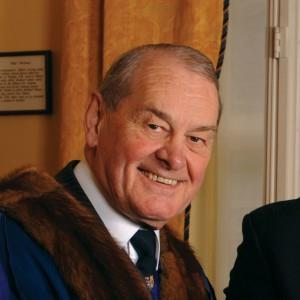Collin Cullimore CBE, who was best known for heading up the Dewhurst Butchery business during its heyday, has died aged 86. He was also a liveryman and past master of the Worshipful Company of Butchers, a position he held from September 2004 to September 2005.

Known for his forthright views and pragmatic approach to industry issues, he came from a meat trade family background Cullimore & Stokes, which had a number of shops in London. However, shunning the family business, he took up a position with Payne & Sons, a small retail group which was then taken over by John Manson Ltd.By this time Colin was representing the company at trade events and it was here that he was spotted by Edmund Vestey of meat trade giant the Vestey Group, who asked Colin to join Dewhurst as a potential future replacement for the retiring general manager.Colin Cullimore was educated at Westminster School, Grenoble University and Smithfield College where he won the Institute of Meat Gold Medal. He also received the Gold Medal Award from the Worshipful Company of Butchers. He served in the Royal Scots Fusiliers – seconded Parachute Regiment and transferred when office cadre formed. He became a Major in 1956 and during his time in the army served in Cyprus and the Canal Zone followed by the TA. He eventually became involved with the NAAFI in later life as a non-executive director and chairman (1993 to 1996). He was honoured with a CBE in the early 1980s.Colin’s meteoric rise started when joined J.H. Dewhurst in 1965 as assistant general manager. He became general manager 1969 and then managing director from 1973-1990. He was an innovator, never afraid of change, and along with his general manager Alan Dann, he always challenged convention, changing the style of meat retailing at Dewhurst to deal with the increasing challenge from supermarket groups that made trading increasingly more difficult for the group during the 1980s and beyond. As early as 1982 Colin was giving dire warnings about the future of long-term meat retailing in the UK, saying that the more meat was sold in multi- commodity stores the less meat will eventually be sold in total.Dewhurst were the one of the first butchers to introduce the innovation of glass windows in its butcher's shops – previously meat had been exposed to the elements and pollution. The company was also a major exhibitor at the Royal Show at Stoneleigh, where Colin would entertain suppliers and industry contacts and his butchers would sell meat to visitors. Under Colin’s direction Dewhurst eventually acquired Baxters Butchers in the mid-80s, at the time regarded as the biggest major competitor to Dewhurst.He was often called upon as ‘Britain’s biggest butcher’ to represent the industry and was a favourite of the media when it came to obtaining comments for national newspapers, television and radio. As time went on Colin developed a healthy distrust of national media and eventually he would only be interviewed live, so his views could not be edited or changed in some way when he expressed them. He actively championed the meat industry during the dark days of BSE and was a severe critic of Professor Lacey, who was at the forefront of negative meat trade propaganda at the time. Describing Lacey as ‘alarmist’ when interviewed by The Times, he said: “He is a scientist, but he is making statements without any real evidence.” The passage of time has done much to add further question marks against the claims made by Professor Lacey and much to vindicate the robust defence of the meat industry championed by Colin Cullimore.During his working lifetime Colin participated in many organisations both within and outside the meat trade. Apart from the NAAFI, he was a commissioner with the Meat and Livestock Commission and was involved with the now defunct Meat Promotion Executive. He was also involved with The Retail Consortium and British Retailers Association. He was chairman of Lincoln Cathedral and a fellow of the Royal Society of Arts, plus a myriad of trade and other organisations.Colin Cullimore CBE, O St. J, DL died on 22
nd December 2015 and leaves a wife, Kathy, and a son, Jeremy.
This story was originally published on a previous version of the Meat Management website and so there may be some missing images and formatting issues.













